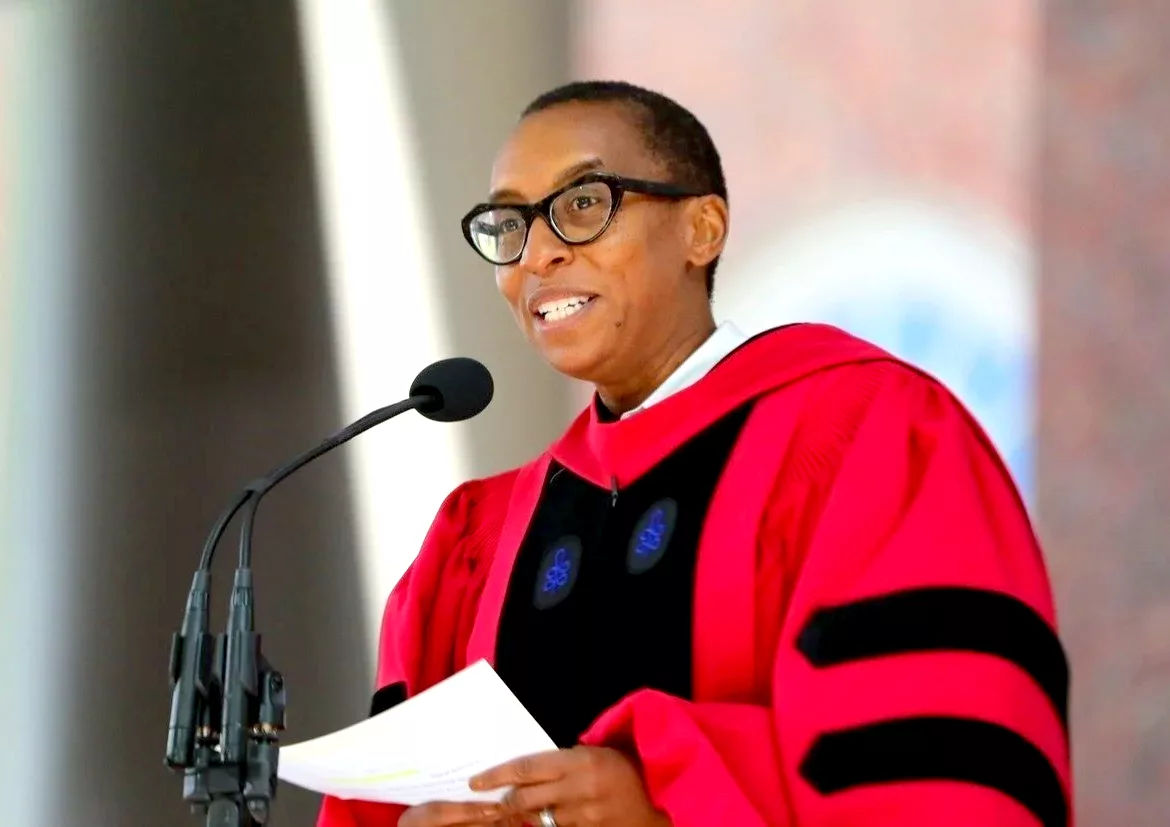
The Inevitable Destruction of Claudine Gay

(Dr. Claudine Gay, photo from Harvard website)
Let me be clear from the start: plagiarism is a serious breach of academic ethics that rightfully incurs serious consequences. At Trinity, those consequences include expulsion for seniors and graduate students. We expect students at that stage of their academic careers to know how to write and do proper citation, to refrain from copying the words and ideas of others without correct attribution. We have expelled students who have violated our policy on plagiarism.
We also expect college and university leaders to be models of academic integrity. So, it seems inevitable that a president whose scholarly writing reveals evidence of plagiarism will not be a president for very long. Such is the case of Claudine Gay, the now-former president of Harvard University. The evidence published in various news outlets shows that Dr. Gay allegedly committed the kind of plagiarism in her dissertation and other papers that warrants severe penalties for students, including dismissal. The president cannot be held to a lesser standard, so her resignation from office earlier this week was inevitable.
If this were simply a case of a college leader’s alleged plagiarism exposed and consequences imposed, the story would end right there. But the case of Dr. Gay is not simply about sloppy citation and some words carelessly lifted from other sources. Dr. Gay has paid a heavy price for those errors in judgment, but her case is far more disturbing, a morality tale about the rancid political climate with its relentless provocateurs seeking to debilitate and constrain the freedom of the university, and to destroy this nation’s hard-won progress on racial and social equity.
Those who are celebrating Dr. Gay’s demise and Harvard’s humiliation are not cheering for academic integrity — except, perhaps, as a foil to promote their goals to put a stake through the heart of Diversity, Equity and Inclusion programs, the practice of affirmative action in admissions and hiring, and all other efforts to promote racial and social justice in this nation, efforts they denounce under the all-encompassing penumbra of “wokeness.” What they are really cheering for is the destruction of a Black woman who dared —- dared! — to sit in the Harvard president’s chair. They are cheering for the shame of Harvard; they are proclaiming victory in the endless battles over racial equity and justice.
In a post on X (formerly Twitter), the conservative commentator Liz Wheeler did not mince words: “Claudine Gay RESIGNS from Harvard in a crushing loss to DEI, wokeism, antisemitism & university elitism. The way to defeat wokeism is to be SAVAGE and relentless. If we are, morality will triumph over Marxism.” Christopher Rufo, one of the people who organized the investigation of plagiarism charges against Dr. Gay, also wrote on X: “We must not stop until we have abolished DEI ideology from every institution in America.” Hmmmm…. Rufo, it seems, wants to abolish DEI, but not a word about abolishing plagiarism!
Dr. Gay’s right-wing critics were sharpening their swords long before the immediate crisis. They attacked her appointment as Harvard’s first Black woman president from the moment of the announcement, calling her appointment a result of “woke” ideology and an example of rampant liberalism in higher education. Conservative members of Congress are part of the chorus chanting doom for higher education. Representative Virginia Foxx (R-NC), chair of the House Committee on Education and the Workforce, wrote in a statement: “Postsecondary education is in a tailspin. There has been hostile takeover of postsecondary education by political activists, woke faculty, and partisan administrators. College campuses are a breeding ground for illiberal thought.”
In fact, in what now appears to be either a cruel coincidence or cleverly orchestrated trap, it was an appearance before Rep. Foxx’s committee that triggered the immediate cause of President Gay’s demise, along with that of President Liz Magill of the University of Pennsylvania. Along with MIT President Sally Kornbluth, the three presidents of arguably the most prestigious universities in the nation testified before the Foxx committee about the response of higher education to the October 7 Hamas attack on Israel and subsequent campus protests including major demonstration by Palestinian students against Israel. The rise of antisemitism on campuses became a focus for committee questions, culminating in Representative Elise Stefanik’s question, “Does calling for the genocide of Jews violate Harvard’s [repeated for Penn and MIT] rules on bullying and harassment?” Each president gave a similarly weak answer: it depends on the context. In the context of that hearing, the answers were unacceptable, too mild and timid. (I wrote about this on an earlier blog.)
The weak responses of the presidents drew a firestorm of protest from major university donors, politicians on both sides of the aisle, student groups and various members of the commentariat. President Magill of Penn was the first to resign as a result of a well-organized campaign against her by wealthy donors at Penn’s Wharton School of Business.
While Magill’s forced resignation arose from relentless donor pressure against her management of the Israeli-Palestinian protests on campus and her weak Congressional testimony, the truly ruthless, racist campaign against President Gay of Harvard was just beginning. The campaign against Dr. Gay had little to do with Israel and everything to do with race in America and the ongoing battle of ideologies between those who desire a more authoritarian state and those who promote more progressive ideas about society and governance. Among the most prominent progressive ideas are those of social justice, tolerance and openness to others, and promotion of opportunities for those who have suffered severe historic oppression including, most notably, African Americans. Conservatives see university campuses as bastions of such thinking, places where academic freedom runs amok, havens for liberal ideas such as deliberately appointing the first Black woman president of Harvard because that “first” is an important marker of social progress for the nation.
Unfortunately, Dr. Gay, it turns out, was a flawed standard bearer, and her academic mistakes came back to haunt her and Harvard. While in no way excusing her plagiarism, we also have to ask whether other university presidents have ever had their body of academic work subject to the same withering examination as hers was during these last few weeks. We have to wonder whether the conservative activists, the members of Congress who have denounced her, the columnists and pundits who have had their field day with her story are all without any hidden deficits that might expose their frailties and compromises should their stories be examined as ruthlessly as hers was.
We have to ask, with sadness and regret, whether Dr. Gay’s story will discourage Black women from pursuing high office in universities and corporations and public positions because the exposure to those whose entire existence is devoted to the abolition of “DEI ideology from every institution in America” will terrorize and debilitate their ability to lead, eventually hounding them out of office to the satisfaction of the wolfpack.
Having asked these questions, we then have to say: NO! We cannot let this happen. Not in higher education. Not in America in the 21st Century. Not to those who are strong enough, courageous enough to step up to positions of leadership.
Yes, we need to advise every prospective leader — and especially women, Black Women, women of color — that they must have spotless records. It is absolutely true that women and people of color have to work twice as hard to be taken seriously, to be considered successful, to be able to run a few steps ahead of the wolfpack. I wrote something on X that was picked up by insidehighered.com : “If there’s one thing I’ve learned over many years as president of a far less visible university: someone is coming for you every day — you have to keep your record spotless because they will find the one loose thread and pull it until you are naked…”
Harvard cannot back down from its commitment to racial justice and social equity. Yes, the nation’s wealthiest and most elite institution of higher education has had a terrible year on that score, from the Supreme Court ruling banning Harvard’s affirmative action practices in admissions to the implosion of President Gay. We smaller, more obscure, less wealthy colleges can probably go about our business without worrying about Harvard’s future — but we should not! Higher education is in the crosshairs of politicians who seek to diminish, if not eliminate entirely, our independence, our academic freedom, our ability to fulfill our critical societal role as a counterweight to government. We must do a better job of defending our enterprise and engaging the fight with those who want less academic freedom and more government mandates about what to teach, who to admit, who to hire and who to fire. We need Harvard and other elite institutions to show some muscle and spine in this fight, to stand up for the principles of equity and justice we believe in, to stop quibbling and start advocating for the future of higher education.
Let Harvard remember and act upon this moving passage from Dr. Gay’s inauguration speech given only so recently (September 29, 2023):
“Not four hundred yards from where I stand, some four centuries ago, four enslaved people—Titus, Venus, Bilhah, and Juba—lived and worked in Wadsworth House as the personal property of the president of Harvard University. My story is not their story. I am a daughter of Haitian immigrants to this country. But our stories—and the stories of the many trailblazers between us—are linked by this institution’s long history of exclusion and the long journey of resistance and resilience to overcome it.”
I appreciate the detailed analysis of the situation involving Claudine Gay and the alleged plagiarism controversy. It’s crucial to address academic integrity issues seriously. However, I would caution against jumping to conclusions without concrete evidence and verified information. It’s essential to rely on reputable sources and fair investigations before making judgments about an individual’s professional conduct. The broader discussion about the intersection of race, politics, and academia adds complexity to the narrative, emphasizing the need for a nuanced understanding of these issues. The commitment to diversity, equity, and inclusion should persist, and any potential challenges should be approached with a fair and just perspective.
https://deeplyread.blogspot.com